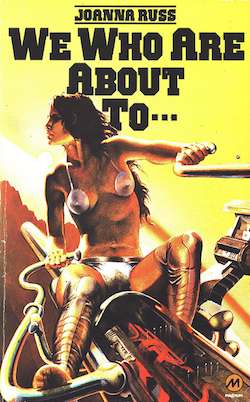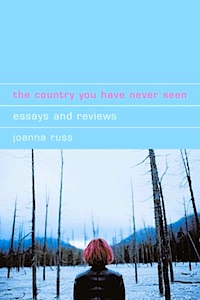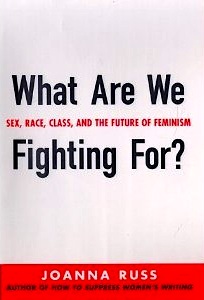Following The Female Man comes a short novel called We Who Are About to , originally published in two parts by the magazine Galaxy in 1976’s January and February issues. Dell published the novel in book form the next year, 1977. This text didn’t receive much contemporary award attention—possibly because of the early ’76 serialization followed by actual, easier-to-find book publication the next year, which would throw off award nomination periods—but it did receive a retroactive James Tiptree Jr. Award in 1996. It is one of the Russ texts still in print, published by the Wesleyan University Press.
We Who Are About to takes on the “crashed spaceship survival novel” tropes popular in SF and pulls them apart one by one while adding a hard dose of realism. I found it challenging (in the best way) and upsetting (also in the best way); We Who Are About to manages to turn a brief 118 pages into a more intense, personal experience than most books three times its size. I found myself taking a break from Russ’s fiction after reading it, as if I couldn’t handle another punch quite like this one so soon. It’s a brutal, sharp-edged, truly “cold equations” style story that wrenches the reader all the way to the ugly, inescapable end. The foreword in the Wesleyan U. Press edition is by Samuel Delany, and he explains it best:
“At the height of the New Wave, an sf convention that particularly exorcised editor Moorecock at New Worlds was what Kurt Vonnegut had already characterized as ‘the impossibly generous universe’ of science fiction: When, in the real world, 95 percent of all commercial airline crashes are one hundred percent fatal and we live in a solar system in which presumably only one planet can support any life at all, from the thirties through the fifties science fiction was nevertheless full of spaceship crashes (!) in which everyone gets up and walks away from the wreckage unscathed—and usually out onto a planet with breathable atmosphere, amenable weather, and a high-tech civilization in wait near-by This is the fundamental convention Russ’s novel takes to task.”
He also says that it’s “her most pristine, if not perfect, book.” I’m inclined to agree—pristine is an ideal word to use for We Who Are About to , which is one of the most concise, beautifully written texts I’ve had the pleasure of encountering. There’s no denying Russ’s talent and skill with prose, evident from her earliest stories, but it’s on full display in this novel. The sentences, the paragraphs, each page to the very end, are put together as crisply and precisely as possible to lead to an ending that is, from the first line, inevitable. It’s a complete story, in a way that most other stories are not, and cannot be, complete.
The opening lines, following the title, are a slap:
We Who Are About to
“About to die. And so on.
We’re all going to die.”
She, the unnamed narrator (potentially called Elaine), is aware of this from the moment their spaceship loses track of itself and they crash-land. The rest of the folk—less so, much less so. They intend to “colonize” the planet, with all of the pseudo-Darwinian science-and-survival motivated joy and belief in their own ability to succeed that one would expect in the average spaceship-crash story. It’s the narrator who points out that it’s impossible—no matter the supplies they have, no matter how much they think reproducing and building a little town will save them, it won’t.
Their mistake, after they’ve lost their own identities and subjectivities in the crash, is to try and take away the narrator’s subjectivity by forcing her to be part of their colonization. They beat her, tie her up, and intend to forcibly impregnate her via rape if she won’t concede to help colonize on her own; their justification is that she’s crazy and doesn’t know better—after all, she wants to kill herself, and she’s a member of a rejected religious cult. She can’t be trusted to make good decisions, and she’s got a perfectly functional woman’s body, so why waste her? It’s chilling to delineate it in such a fashion, but that’s where the story leads the reader.
We Who Are About to is working on so very many levels at once that it’s difficult to talk about them as one coherent whole, despite the fact that the book is a perfectly coherent whole.
While it is, as I’ve said, a book intended to lampoon and deconstruct the “crash-landing survival story,” it’s also a book of intense, painful social critique that deals harshly with the ease with which identity can break down. The professor finds himself useless in the wilds, the otherwise goodhearted football player type realizes that there’s nothing stopping him from beating up a woman to take control of her and mentally devolves a few thousand years, et cetera. The crash obliterates identity because identity, for the archetypal characters, is social—with the removal of any chance of society ever again, they must redefine a new version of identity, and because they are forced to do so, the narrator—who remained with her own identity, as she was not exactly a social animal back home—cannot fit in; she cannot be allowed to rebel or to simply leave them. She tries; she even sends the hovercraft tool back to the camp when she escapes.
They still try to find her and drag her back, instead of letting her die alone and in peace. She, the iconic antihero narrator, must defend her subjectivity by any means necessary and available. This isn’t where the text “crosses over” into feminist territory, as there’s no bit of Russ’s work that isn’t informed by feminism, but this particular bit of the narrative stands out. The narrator kills or provides the means of death to each other character in turn, to defend her own ability to die as she likes. The brutality of it—not in the manners of death, those are fairly economical and simple—is enough to twist the readers’ guts; it’s the emotional brutality, the force of a woman pushed entirely too far just to be able to retain her own bodily subjectivity. It’s an excellent feminist allegory at the same time that it’s an inevitable part of the narrative and the thematic sensibility regarding the fragile nature of life/identity.
Then, there’s the segue into the last third of the story—oh, yes, everyone else, including the child, has died already by that point. The last third is the most difficult; if what came before was challenging, what comes next is the part that’s most upsetting. The last third is recollections told to the recording machine of the narrator’s life as she dies, slowly, of starvation. It follows her as she becomes increasingly more delusional and weak, as her body decays, as her life leaks away. She could poison herself, but she chooses not to for a horribly long while. The reader is stuck with her as she fades. It’s so goddamn intense; there’s simply no other word. Possibly, transcendental. Inevitable. The ending of We Who Are About to is the only ending for the story, but it’s at once difficult to finish and impossible not to follow to the close.
I understand other readers’ criticisms of this book, as I’ve heard them in conversation and online—it’s too much. It asks too much, emotionally, of the reader; even in The Lord of the Flies, there is a rescue after the initial lengthy horror. There is always a rescue. Russ dangles the hallucination of rescue before her narrator at the very end, and in doing so also in front of the reader—but it’s not real.
There is no rescue. “We who are about to die,” after all. It wasn’t pessimistic metaphor. She means it.
As I said, I understand the criticism but I don’t agree with it. Books rarely ask so much of the reader, true, but perhaps they should. We Who Are About to is brutal, unforgiving, and also supremely, astoundingly beautiful, not simply because of Russ’s phenomenal, unmatched prose but because of the journey it takes the reader through. In fact, I might go further than Delany—I might be willing to call this book perfect, not just pristine, in the sense that it does exactly what it was intended to do, on every level it was intended to do it on, at the same time.
It’s a small book, but it isn’t a fast read or an easy one. I would still recommend it over anything else you might pick up this month, for the experience. We Who Are About to is commentary on a science fiction trope that’s problematic, an examination of identity politics, a lampooning of society and civilization as well as the colonizing urge, a feminist text on a woman’s physical subjectivity, an examination of brutality—and still more than I can encompass here on a purely craft-oriented level. (For example, I haven’t touched on the idea of audience and text in the text itself; the use of a recording device by the narrator to tell the story to an audience of zero, within the story that is read as a text by us the real-world reader, et cetera.)
Russ was at top form in We Who Are About to , I’ll safely posit. Even the reader who cannot handle the text, who recoils from it as “pointless” because it opens and ends with inevitable death, must acknowledge the skill of the prose and the SFnal setting as an integral part of the story. It does not glory in its violence; in fact it abhors it, but that makes the novel no less violent.
It is simply a fact. Survival—of the body, of the identity, of anything—is not on offer. There is only the inevitable, and arriving at it.
*
Next, a book that I have a problematic relationship with: The Two of Them.
Lee Mandelo is a multi-fandom geek with a special love for comics and queer literature. She can be found on Twitter and Livejournal.














